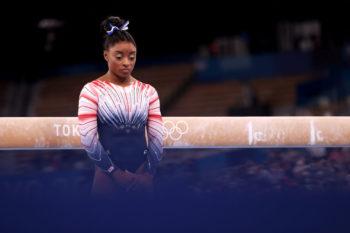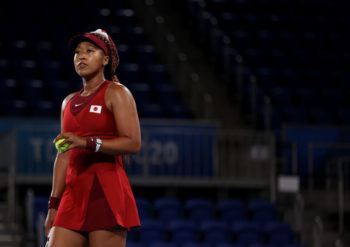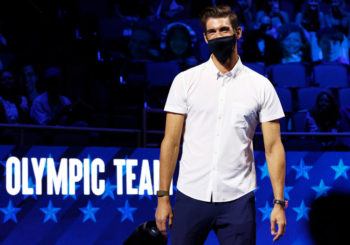Mental Health Takes Center Stage At Tokyo Olympics

U.S. gymnast Simone Biles cited her mental well-being after removing herself from the gymnastics team final at the Tokyo Olympics, saying she was not in the right headspace. “I have to do what’s right for me and focus on my mental health, and not jeopardize my health and well-being,” she said after Team USA won the silver medal in the team competition. She later withdrew from the individual all-around competition, as well as the finals for three more events — but won her seventh Olympic medal after taking bronze on the balance beam.
Biles joined several other elite athletes who have spoken publicly about mental health struggles. Swimmer Michael Phelps has previously said he contemplated suicide after the 2012 Olympics, and tennis star Naomi Osaka withdrew from the French Open earlier this summer to focus on her mental health, sharing that she has struggled with depression.
Psychology professor Arnold LeUnes, whose research interests include psychological assessment in sport, youth sport, and sport history, has taught and studied sports psychology at Texas A&M University for 56 years. LeUnes spoke with the College of Liberal Arts about the sports psychology field, the psychological demands placed on athletes, and how athletes can train mentally for physical competitions.
Is there a stigma around athletes and mental health?
Fifty years ago, people seeking counseling were too often viewed as weak, indecisive, incapable of dealing with life, and irresponsible, among other things. Those sorts of responses were exacerbated in sport psychology because of the prevailing view that only the weak and insecure athlete would seek psychological assistance.
Thirty years ago, an undergraduate student, SueAnn Hayward, and I surveyed 150 departments of psychology about their attitudes toward sport psychology. One respondent said the field was a “flash in the pan, soon to die.” Another said that he could think of “no greater waste of a human neuron than devoting so much as one of them to something as trivial as sports.” Both of these responses are reminders of the stigma, but it should be noted that the majority of the respondents to our survey were mildly or greatly supportive in their views. It is important to note that these responses were from psychologists, not your everyday American citizen.
How does this affect athletes competing at the national or international levels?
It has become clear over the years that athletes are not immune to stress and resultant mental health issues. For example, recent research commissioned by the United States Olympic and Paralympic Committee (USOPC) indicated that 58 percent of the elite athletes in their study tested positive for a mental health issue on the Sport Mental Health Assessment Tool (SMHAT). This statistic is based on only one study, but it strongly suggests a mental health problem among athletes performing at the highest levels.
Among elite athletes at the national and global level, these barriers are continually being challenged as superstars such as gymnastics wunderkind Simone Biles, tennis star Naomi Osaka, and the greatest swimmer of all-time, Michael Phelps, advocate for a better understanding of mental health. Having said all this, there are more “macho” sports like American football, rugby and baseball where it is often seen as unmanly to admit to psychological problems. Progress in those sports is heartening, but the macho masculinity code so embedded in the sports culture remains problematic.
Overall, however, there has been highly encouraging growth in the acceptance of psychological services as part of the overall development of athletes across a wide spectrum of sports.

What psychological factors play a role in an athlete’s ability to compete on any given day?
There are a number of factors to consider here. Fear of debilitating or career-ending injury looms ominously in the athlete psyche. A debilitating or career-ending injury is never far away in virtually all sports.
A second factor is competitive pressure. It never lets up for the elite athlete. They are always training, get few periods of respite to relax and re-energize. Life, in many ways, is a roller coaster. As one Olympic athlete said, “Competition is like a drug, addictive because of the highs and the lows. You are perpetually on uppers and downers through competition.”
Burnout/overtraining is yet another source of stress and strain. It is a delicate balance, trying to be at your peak at the right moment (i.e., the Olympics) and yet not overdoing preparation and burning out. In this regard, I am reminded of a young woman who took my sport psychology class in 2018 who was both an Olympian (for Croatia) and a swimmer for our university. I made a statement in class about burnout and physical and mental fatigue among athletes following the Olympic Games, and she came by later to tell me she herself felt no fatigue or burnout at all. Two weeks later, she hit a wall, called her coach in Croatia, resigned from the team, and visited her coach at A&M where she permanently resigned from competition. She never swam competitively again.
Social media creates another brand of stress; they are everywhere, relentless, and bring a whole new dimension to competitive stress.
The pandemic introduced its own horrors to athletic training. Elite athletes have been training for the past four years of the Olympics without any guarantee they would even be allowed to compete. The one-year delay in 2020 and the near-cancellation of the Tokyo Olympics in 2021 have created an environment of uncertainty that greatly affected training and the morale of athletes all over the world.
A sixth concern is identity. Without sports, many competitors are lost because they have no other identity other than athlete. As one Olympian said, “I don’t know who I am without my sport.”
Finally, the pressure to cheat looms large in some competitors. Sport psychology can provide a competitive edge for athletes and, unfortunately, so can performance-enhancing drugs. One of my past doctoral students was an elite athlete with a relatively slight build for a professional football player. He and I talked extensively about the pros and cons of him getting on steroids to bulk up in a sport where size and strength are so critical. Fortunately, he ultimately chose the drug-free alternative of weight training, sensible diet, and plain old hard work.
Why is it important for high profile athletes like Simone Biles and Michael Phelps to address athletes’ mental health?
Hearing the mental health message from two of the greatest competitors to ever play sports lends instant credibility in the minds of other superstars. That these sport superstars are capable of moments of weakness and vulnerability adds a very important element of humanity to the whole process. In the minds of other elite athletes, if states like depression, anxiety, and doubt can happen to Phelps, or Biles, or Osaka, it means it can happen to me and it is okay to admit their vulnerability. Their messages help strip some of the stigma attached to admitting personal difficulty and seeking professional assistance.

How does everything we’ve discussed so far relate to Simone Biles’ withdrawal from Olympic events?
The woman is 24 years old, has trained at the highest and most stressful level of the preponderance of her life, and is wealthy with a 2021 estimated personal wealth of $10 million. In addition, she is personable, charismatic, blessed with incredible athletic ability and heavily and unfairly burdened with the responsibility of being a media darling and the face of the controversial multi-billion-dollar 2020 Tokyo Games. What a load to carry.
Throw on top of that the burden of a draconian diet and training regimen that would make the legendary Hercules blanch. Only the truly world-class elite athlete knows what Simone Biles and others like her have endured to get to the lofty status they occupy in the athletic world. I think the woman simply reached her personal breaking point and did it during the Olympic Games in front of millions of people, not two or three weeks later in my classroom like my Croatian swimmer. Young Miss Biles did it in front of the world, and it must have taken all she had to throw in the towel like she did.
It is my fondest hope that Simone Biles will move on to bigger and better things as an ordinary citizen after these Olympic Games (if that is possible for someone of her fame and notoriety).
How can athletes train mentally for competition?
Elite athletes would do well to train hard, compete hard but fairly, avoid drugs and illegal procedures, listen to their coaches and trainers, and perhaps most importantly, live a full and rewarding career, social, and family life outside of sports.
Athletes at the elite level are obsessed with the Olympic Gold Medal, and will do virtually anything to win one. There is a popular notion floating around in the sport psychology literature called the Goldman Dilemma. Years ago, a physician by the name of Robert Goldman posed a question in which he asked a sample of elite athletes if they would take a magic substance that would guarantee them the cherished, the highly-coveted Olympic gold medal knowing full well they would die in five years as a result of the substance.
Fifty-two percent of the athletes in question agreed that they would take the pill and suffer the dire consequences. The Goldman Dilemma has been challenged on a number of methodological grounds, but there is no question that elite athletes will indeed pay an awful price to win that coveted gold medal.
Viewing competition from a process as opposed to a product orientation to participation would do wonders for mental health in sports ranging from the rawest beginners to elite performers. In the product orientation, winning is everything; the amassing of trophies and other tangible rewards is a major goal. The seeking of adulation is important, and fellow competitors are seen as the enemy. In the process orientation, participation is an end goal in itself. If one competes well, winning and amassing medals takes care of itself. There is a striving for personal and team excellence, the sport is appreciated for its aesthetic properties, and opponents are a valued commodity, for without them there would be no competition.
This article by Rachel Knight originally appeared on the College of Liberal Arts website.





